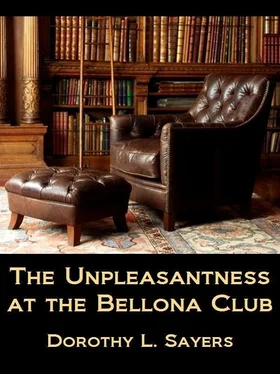“She was always very pleasant to me ” said Nurse Armstrong. “I shouldn’t call her an attractive girl, not to my mind.”
“Did she ever mention Lady Dormer’s testamentary arrangements in your hearing?” asked Parker, picking up what he conceived to be Wimsey’s train of thought.
“Well — not exactly. But I remember her once talking about her painting, and saying she did it for a hobby, as her aunt would see she always had enough to live on.”
“That’s true enough,” said Parker. “At the worst, she would get fifteen thousand pounds, which carefully invested, might mean six or seven hundred a year. She didn’t say she expected to be very rich?”
“No.”
“Nor anything about the General?”
“Not a word.”
“Was she happy?” asked Wimsey.
“She was upset, naturally, with her aunt being so ill.”
“I don’t mean that. You are the sort of person who observes a lot — nurses are awfully quick about that kind of thing, I’ve noticed. Did she strike you as a person who — who felt right with life, as you might say?”
“She was one of the quiet ones. But — yes — I should say she was satisfied with things all right.”
“Did she sleep well?”
“Oh, she was a very sound sleeper. It was a job to wake her if anything was wanted in the night.”
“Did she cry much?”
“She cried over the old lady’s death; she had very nice feelings.”
“Some natural tears she shed, and all that. She didn’t lie about and have awful howling fits or anything like that?”
“Good gracious, no!”
“How did she walk?”
“Walk?”
“Yes, walk. Was she what you’d call droopy?”
“Oh, no — quick and brisk.”
“What was her voice like?”
“Well, now, that was one of the nice things about her. Rather deep for a woman, but with what I might call a tune in it. Melodious,” said Nurse Armstrong with a faint giggle, “that’s what they call it in novels.”
Parker opened his mouth and shut it again.
“How long did you stay on at the house after Lady Dormer died?” pursued Wimsey.
“I waited on till after the funeral, just in case Miss Dorland should need anybody.”
“Before you left, did you hear anything of this trouble about the lawyers and the wills?”
“They were talking about it downstairs. Miss Dorland said nothing to me herself.”
“Did she seem worried?”
“Not to notice.”
“Had she any friends with her at the time?”
“Not staying in the house. She went out to see some friends one evening, I think — the evening before I left. She didn’t say who they were.”
“I see. Thank you. Nurse.”
Parker had no more questions to put, and they took their leave.
“Well,” said Parker, “how anybody could admire that girl’s voice—”
“You noticed that! My theory is coming out right, Charles. I wish it wasn’t. I’d rather be wrong. I should like to have you look pitifully at me and say, ‘I told you so.’ I can’t speak more strongly than that.”
“Hang your theories!” said Parker. “It looks to me as if we shall have to wash out the idea that General Fentiman got his dose in Portman Square. By the way, didn’t you say you’d met the Dorland girl at the Rushworths?”
“No. I said I went hoping to meet her, but she wasn’t there.”
“Oh, I see. Well, that’ll do for the moment. How about a spot of lunch?”
At which point they turned the corner and ran slap into Salcombe Hardy, emerging from Harley Street. Wimsey clutched Parker’s arm suddenly. “I’ve remembered,” he said.
“What?”
“Who that portrait reminds me of. Tell you later.”
Sally, it appeared, was also thinking of grub. He was, in fact, due to meet Waffles Newton at the Falstaff. It ended in their all going to the Falstaff.
“And how’s it all going?” demanded Sally, ordering boiled beef and carrots.
He looked limpidly at Parker, who shook his head.
“Discreet man, your friend,” said Sally to Peter. “I suppose the police are engaged in following up a clew — or have we reached the point when they are completely baffled? Or do we say that an arrest is imminent, eh?”
“Tell us your own version, Sally. Your opinion’s as good as anybody’s.”
“Oh, mine! — Same as yours — same as everybody’s. The girl was in league with the doctor, of course. Pretty obvious, isn’t it?”
“Maybe,” said Parker, cautiously. “But that’s a hard thing to prove. We know, of course, that they both sometimes went to Mrs. Rushworth’s house, but there’s no evidence that they knew each other well.”
“But you ass, she—” Wimsey blurted out. He shut his mouth again with a snap. “No, I won’t. Fish it out for yourselves.”
Illumination was flooding in on him in great waves. Each point of light touched off a myriad others. Now a date was lit up, and now a sentence. The relief in his mind would have been overwhelming, had it not been for that nagging central uncertainty. It was the portrait that worried him most. Painted as a record, painted to recall beloved features — thrust face to the wall and covered with dust.
Sally and Parker were talking.
“… moral certainty is not the same thing as proof.”
“Unless we can show that she knew the terms of the will…”
“… why wait till the last minute? It could have been done safely any time…”
“They probably thought it wasn’t necessary. The old lady looked like seeing him into his grave easily. If it hadn’t been for the pneumonia.”
“Even so, they had five days.”
“Yes — well, say she didn’t know till the very day of Lady Dormer’s death…”
“She might have told her then. Explained… seeing the thing had become a probability…”
“And the Dorland girl arranged for the visit to Harley Street…”
“… plain as the nose on your face.”
Hardy chuckled.
“They must have got a thundering shock when the body turned up the next morning at the Bellona. I suppose you gave Penberthy a good gruelling about that rigor. ”
“Pretty fair. He fell back on professional caution, naturally.”
“It’s coming to him in the witness-box. Does he admit knowing the girl?”
“He says he just knows her to speak to. But one’s got to find somebody who has seen them together. You remember the Thompson case. It was the interview in the tea-shop that clinched it.”
“What I want to know,” said Wimsey, “is why—”
“Why what?”
“Why didn’t they compromise?” It was not what he had been going to say, but he felt defeated, and those words would end the sentence as well as any others.
“What’s that?” asked Hardy, quickly.
Peter explained.”
“When the question of survivorship came up, the Fentimans were ready to compromise and split the money. Why didn’t Miss Dorland agree? If your idea is the right one, it was much the safest way. But it was she who insisted on an inquiry.”
“I didn’t know that,” said Hardy. He was annoyed. All kinds of “stories” were coming his way to-day, and tomorrow there would probably be an arrest, and he wouldn’t be able to use them.
“They did agree to compromise in the end,” said Parker. “When was that?”
“After I told Penberthy there was going to be an exhumation,” said Wimsey, as though in spite of himself.
“There you are! They saw it was getting too dangerous.”
“Do you remember how nervous Penberthy was at the exhumation?” said Parker. “That man — what’s his name’s — joke about Palmer, and knocking over the jar?”
“What was that?” demanded Hardy again. Parker told him, and he listened, grinding his teeth. Another good story gone west. But it would all come out at the trial, and would be worth a headline.
Читать дальше












